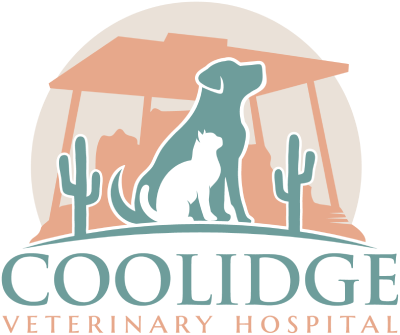Veterinary Insights into Causes, Concerns, and Care
At Coolidge Veterinary Hospital, one of the most frequent and heartfelt concerns we hear from loving pet parents is: "Why does my dog have diarrhea?"
We understand how overwhelming and distressing it is to see your furry family member feeling under the weather. Diarrhea is not only messy and uncomfortable but can sometimes be a sign of something more serious. While some cases are mild and resolve quickly, others may require prompt veterinary attention to avoid potentially dangerous complications. Small breed dogs and young puppies are particularly vulnerable, as diarrhea can quickly lead to hypoglycemia (low blood sugar) or dangerous dehydration. Any instance of bloody diarrhea should always prompt an immediate call to your veterinarian.
Our goal is to help you better understand the common causes of diarrhea in dogs, the red flags to watch for, and how we can work together to restore your pet’s health and happiness.
1. Dietary Indiscretion (Eating Something They Shouldn’t)
Dogs are naturally curious and tend to explore the world with their mouths. Unfortunately, this curiosity can lead them to eat things they shouldn’t, such as trash, spoiled food, table scraps, or random objects outside. This is known as "garbage gut" and is one of the most common causes of sudden diarrhea.
Signs to watch for:
- Loose or watery stools
- Possible vomiting
- Otherwise normal playful behavior
In most mild cases, diarrhea resolves with rest, a bland diet of boiled chicken and rice, and plenty of water. However, if symptoms persist beyond 24–48 hours or worsen, it’s time to call your veterinarian for advice.
2. Sudden Changes in Diet
Dogs’ digestive systems thrive on consistency. An abrupt switch to a new food, no matter how healthy or high-quality, can upset the delicate balance of gut bacteria and cause diarrhea. To avoid this, we recommend transitioning to new food gradually over a period of 7–10 days.
3. Parasites
Parasites are a frequent cause of diarrhea, especially in puppies, rescue dogs, and dogs that spend time in social environments like parks or daycares. Common culprits include roundworms, hookworms, giardia, and coccidia. Some of these parasites are zoonotic, meaning they can infect humans too.
At our clinic, we can perform a fecal exam to quickly identify parasites and prescribe the right deworming medications. Left untreated, parasitic infections can result in chronic diarrhea, malnutrition, or anemia.
4. Bacterial or Viral Infections
Diarrhea may also result from bacterial or viral infections that inflame the digestive tract. Infections often cause other symptoms such as vomiting, fever, and reduced appetite. Puppies are especially susceptible to rapid dehydration in these cases.
Common infections include:
- Parvovirus
- Distemper
- Salmonella or Campylobacter
- Clostridium overgrowth
- Tick-borne illnesses like Anaplasmosis
Early intervention is critical to managing these infections and supporting recovery.
5. Food Sensitivities and Allergies
Some dogs develop sensitivities or allergies to specific ingredients in their food, such as certain proteins (chicken, beef) or grains. These sensitivities can cause chronic diarrhea along with other signs like:
- Skin irritation or itching
- Chronic ear infections
- Excessive paw licking or chewing
Our team can assist with elimination diets or recommend specialized hypoallergenic foods to help identify and manage your dog’s sensitivities.
6. Stress and Anxiety
Dogs can develop diarrhea from emotional stress or anxiety, similar to how some people experience digestive upset before a stressful event. This condition, often called stress colitis, is usually temporary.
Common stress triggers include:
- Boarding or doggy daycare
- Changes in household routine
- Separation anxiety
- Fireworks, thunderstorms, or travel
We can offer advice on calming strategies, supplements, or medications to ease your dog’s anxiety and prevent stress-related digestive upset.
7. Chronic Health Conditions and Inflammatory Diseases
Ongoing diarrhea may be an indicator of a deeper chronic issue. If your dog is also experiencing vomiting, weight loss, or appetite changes, more serious health problems could be involved.
Conditions to consider include:
- Inflammatory Bowel Disease (IBD)
- Pancreatitis
- Liver or kidney dysfunction
- Addison’s disease
- Immune-mediated diseases
- Certain cancers
Diagnostic tests such as blood work, imaging, and biopsies may be needed to pinpoint the cause and create a treatment plan.
8. Foreign Body Ingestion or Toxin Exposure
Sometimes dogs swallow items they shouldn’t - like socks, bones, toys, or sticks, leading to digestive upset or even dangerous blockages. Diarrhea can also result from exposure to toxins.
Examples of common toxins include:
- Toxic plants (Oleander, Sago Palm)
- Chocolate
- Xylitol (found in sugar-free gum and baked goods)
- Grapes and raisins
- Marijuana, vape products, or Bufo toads
In some cases, emergency surgery may be required to remove the obstruction or treat the effects of toxicity.
9. Medication or Vaccine Reactions
Though rare, some dogs may have adverse reactions to medications or vaccines, with diarrhea being one potential symptom.
Other possible signs include:
- Vomiting
- Swelling of the face or muzzle
- Hives or severe itching
- Lethargy
Call your veterinarian immediately if you notice any combination of these signs following a new medication or vaccination.
10. Parvovirus & Distemper in Puppies
Puppies are particularly vulnerable to contagious and often fatal diseases like parvovirus and distemper. Both can cause profuse diarrhea, vomiting, lethargy, and systemic illness.
Vaccination is the best prevention, but if your puppy shows any concerning symptoms, urgent veterinary care is essential to give them the best chance of recovery.
When Should You Call the Vet?
It’s not always easy to know when to wait and when to take action.
Please call us immediately if your dog:
- Has diarrhea lasting longer than 24 hours
- Passes blood in their stool (red or black/tarry)
- Vomits alongside diarrhea
- Displays lethargy, weakness, or pain
- Refuses food or water
Our team is always happy to provide guidance and help you decide on the best course of action.

